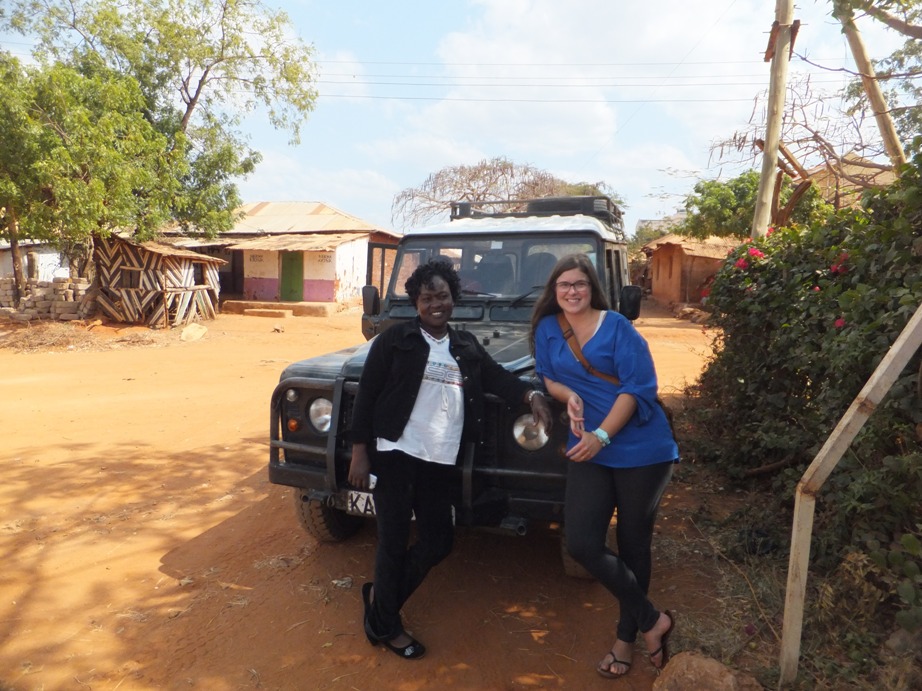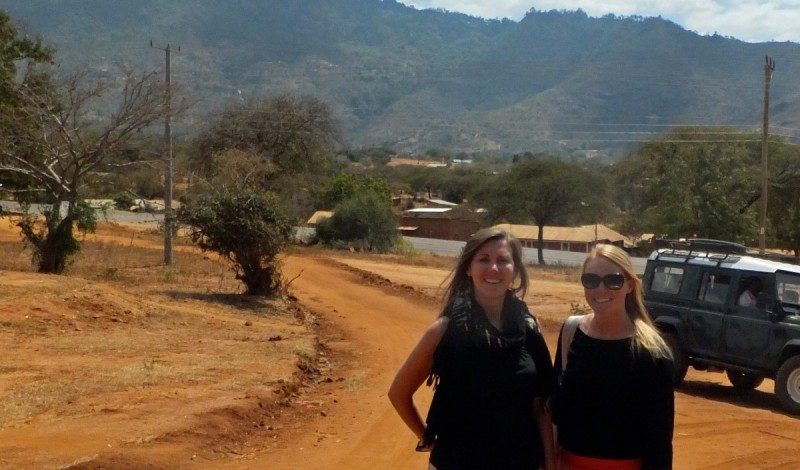
Joyce Wakilo and Rebecca Krause in Nairobi. Photo: Leah Crockett
Into Africa: Health students promote nutrition to women, children
Instead of spending last summer studying so she could finish her Bachelor of Nursing degree a few months early, fourth-year nursing student Rebecca Krause was offered – and accepted – the chance to travel to Kenya for three months to work on the Mwanzo Mwema project.
“I couldn’t resist. I knew this was the opportunity I had been hoping for since the beginning of my academic career,” says Krause.
The Mwanzo Mwema project (which in Swahili means best start/healthy beginnings) is a partnership between the Universities of Manitoba and Nairobi; supported by the Government of Canada through the Canadian International Development Agency (CIDA). The agency funds the Students for Development (SFD) program which is administered through the Association of Universities and Colleges of Canada.
The objective is to create a model of delivering critical nutritional and maternal, neonatal and child health (MNCH) services to vulnerable women, infants and children in the Taita Taveta district of Coastal province in Kenya.
Krause was en route by early May. “I went open-minded, prepared to do what I could and use whatever skills I had gained until this point in relation to cross-cultural immersion and health promotion.”
She spent her first few weeks getting to know the country, the project, and meeting with colleagues, leaders, and in-country partners. Her role would see the establishment of a curriculum for Community Health Workers (CHW): health care providers who go into the homes of families and link those families to health services in that community through referrals.
According to Krause the CHWs provided a great deal of teaching on issues that can present during pregnancy, after birth, and during a child’s first few years of life.
A month into the project Krause was joined by Leah Crockett, a master’s student in Community Health Sciences, Faculty of Medicine. Crockett also recalls feeling excited and grateful of the “life-changing opportunity.”
Though she’s conducting her research on a local level, using data collected by the medical faculty’s Manitoba Centre for Health Policy, Crockett is particularly interested in health inequities on a global scale.
“I felt this experience would enhance my ability to conduct meaningful research and give me an opportunity to learn and apply different frameworks, such as program science, to develop context specific research-driven community initiatives that aim to mobilize and empower communities,” says Crockett.
To date the project has developed and implemented tools to conduct rapid assessments to identify gaps in critical health services and nutritional needs (phase I) and is currently implementing a health and nutrition community link worker program to improve utilization of critical health interventions and nutrition programs (phase II).
“During our three months in Kenya we worked on phase II of the project; developing resources and training materials for field officers and CHWs,” Crocket explains. “We also developed care cards for the CHWs to bring with them into the homes.”
The materials and care cards cover key areas identified across the continuum of care, including a range of topics within the pre-conception, antenatal, labour and delivery, postpartum and childhood stages.
Krause adds: “This was based on months of baseline survey work within homes and communities as well as ongoing collaboration between the partners and community members – phase I.”
The CHW approach was modeled after other successful models of mobilizing and training individuals from within a community to “link” its members with critical health services and reach women and children in their homes.
Another key component of this project, conducted through the Faculty of Medicine’s Centre for Global Public Health, is to design and implement projects in a way that is sustainable for communities long-term. “Generally, many development programs end when the funding ends,” says Crockett.
To overcome this, the project was designed to work within existing health infrastructure and build the capacity of local partners and community members to address and respond to the health care and nutritional needs throughout the design, implementation, monitoring and delivery stages of the project. Thus allowing locals to carry forward the knowledge gained and build on long-term progress.
“The fourth and final group of SFD students is now in Kenya experiencing the implementation portion of the project. Unfortunately SFD funding ends Dec. 31,” says Krause, who points to her time in Kenya as solidifying her interest in public health on a global scale.
“Beyond that it has also strengthened my passion to pursue an understanding of health inequities experienced by Canada’s northern populations,” she adds.
Crockett nods in agreement. “My time in Kenya was more than I could have hoped for. It not only allowed me to gain a greater understanding of health inequities and social justice issues, but also to then reflect this over to our situation in Canada, where surprisingly we have many parallels.”
Growing up in northern Manitoba sparked Crockett’s strong interest in how health care is delivered in rural and isolated areas. “I noticed many similarities when working in rural communities in Kenya. I also had exposure to project development and implementation at the grassroots level, experienced some of the challenges of development work, and learnt the importance of working closely with the community – they are the experts and truly amazing, strong individuals.”







